Engine Unit -- Inspection |
| 1. INSPECT NO. 1 VALVE ROCKER ARM SUB-ASSEMBLY |
Turn the roller by hand to check that it turns smoothly.
- HINT:
- If the roller does not turn smoothly, replace the valve rocker arm sub-assembly.
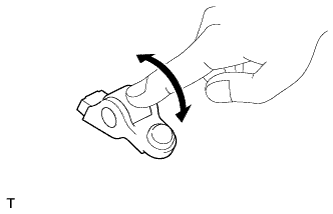 |
| 2. INSPECT VALVE LASH ADJUSTER ASSEMBLY |
- NOTICE:
- Keep the lash adjuster free of dirt and foreign matter.
- Only use clean engine oil.
Place the lash adjuster into a container filled with engine oil.
Insert the tip of SST into the lash adjuster plunger and use the tip to press down on the check ball inside the plunger.
- SST
- 09276-75010
 |
Squeeze SST and the lash adjuster together to move the plunger up and down 5 to 6 times.
Check the movement of the plunger and bleed it.
- OK:
- Plunger moves up and down.
- NOTICE:
- When bleeding the high-pressure chamber, make sure that the tip of SST is actually pressing the check ball as shown in the illustration. If the check ball is not pressed, the high-pressure chamber will not be bled.
After bleeding, remove SST. Then try to quickly and firmly press the plunger by hand.
- OK:
- Plunger is very difficult to move.
| 3. INSPECT CAMSHAFT TIMING GEAR ASSEMBLY |
Install the camshaft timing gear (COROLLA_ZRE142 RM0000027I90ANX.html).
Check the lock of the camshaft timing gear.
Confirm that the camshaft timing gear is locked.
Release the lock pin.
Cover the 4 oil paths of the cam journal with vinyl tape as shown in the illustration.
- HINT:
- There are 4 oil paths in the groove of the camshaft. Plug three of the paths with pieces of rubber.
Prick a hole in the tape placed on the retard side path, on the opposite side to that of the advance side path, as shown in the illustration.
While applying approximately 150 kPa (1.5 kgf/cm2, 22 psi) of air pressure to the oil paths, forcibly turn the camshaft timing gear assembly in the advance direction (counterclockwise).
- CAUTION:
- Cover the paths with a piece of cloth when applying pressure to keep oil from spraying.
- NOTICE:
- Do not lock the camshaft timing gear assembly. If it is locked, release the lock pin again.
- HINT:
- The camshaft timing gear assembly may be turned in the advance direction without applying any force.
- If enough air pressure cannot be applied because of air leakage from the port, releasing the lock pin may be difficult.
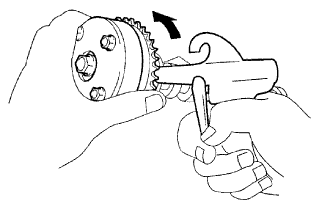
 |
Check for smooth rotation.
Turn the camshaft timing gear within its movable range (26.5 to 28.5°) 2 or 3 times, but do not turn it to the most retarded position. Make sure that the gear turns smoothly.
- NOTICE:
- Do not lock the camshaft timing gear assembly. If it is locked, release the lock pin again.
| 4. INSPECT CAMSHAFT TIMING EXHAUST GEAR ASSEMBLY |
Install the camshaft timing exhaust gear (COROLLA_ZRE142 RM0000027I90ANX.html).
Check the camshaft timing exhaust gear lock.
Make sure that the camshaft timing exhaust gear is locked.
Release the lock pin.
Cover the 4 oil paths of the cam journal with vinyl tape as shown in the illustration.
- HINT:
- The 4 oil paths are provided in the grooves. Plug 2 paths with rubber pieces.
Prick a hole in the tape placed on the advance side path. Prick a hole in the tape placed on the retard side path, on the opposite side to that of the advance side path, as shown in the illustration.
Apply approximately 200 kPa (2.0 kgf/cm2, 28 psi) of air pressure to the 2 paths (the advance side path and the retard side path).
- CAUTION:
- Cover the paths with a piece of cloth when applying pressure to keep oil from spraying.
Make sure that the camshaft timing exhaust gear turns in the retard direction when reducing the air pressure applied to the advance side path.
- HINT:
- The lock pin is released and the camshaft timing exhaust gear turns in the retard direction.
When the camshaft timing exhaust gear moves to the most retarded position, release the air pressure from the advance side path, then release the air pressure from the retard side path.
- NOTICE:
- Be sure to release the air pressure from the advance side path first. If the air pressure of the retard side path is released first, the camshaft timing exhaust gear may abruptly shift in the advance direction and break the lock pin or other parts.


 |
Check for smooth rotation.
Turn the camshaft timing exhaust gear within its movable range (19 to 21°) 2 or 3 times, but do not turn it to the most advanced position. Make sure that the gear turns smoothly.
- NOTICE:
- When the air pressure is released from the advance side path, then from the retard side path, the gear automatically returns to the most advanced position due to the advance assist spring operation and locks. Gradually release the air pressure from the retard side path before performing the smooth rotation check.
Check the lock at the most advanced position.
Make sure that the camshaft timing exhaust gear is locked at the most advanced position.
| 5. INSPECT CHAIN SUB-ASSEMBLY |
Pull the chain with a force of 147 N (15 kgf, 33 lbf) as shown in the illustration.
 |
Using a vernier caliper, measure the length of 15 links.
- Maximum chain elongation:
- 115.2 mm (4.535 in.)
- NOTICE:
- Perform the measurement at 3 random places. Use the average of the measurements.
| 6. INSPECT NO. 2 CHAIN SUB-ASSEMBLY |
Pull the chain with a force of 147 N (15 kgf, 33 lbf) as shown in the illustration.
 |
Using a vernier caliper, measure the length of 15 links.
- Maximum chain elongation:
- 102.1 mm (4.019 in.)
- NOTICE:
- Perform the measurement at 3 random places. Use the average of the measurements.
| 7. INSPECT OIL PUMP DRIVE GEAR |
Place the chain around the gear.
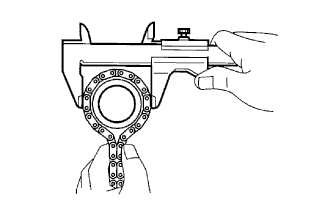 |
Using a vernier caliper, measure the diameter of the gear and chain.
- Minimum gear diameter (with chain):
- 48.2 mm (1.898 in.)
- NOTICE:
- The vernier caliper must be in contact with the chain rollers when measuring.
| 8. INSPECT OIL PUMP DRIVE SHAFT GEAR |
Place the chain around the gear.
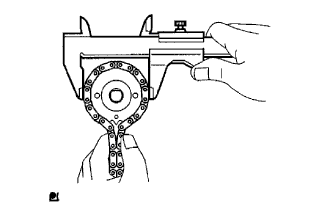 |
Using a vernier caliper, measure the diameter of the gear and chain.
- Minimum gear diameter (with chain):
- 48.8 mm (1.921 in.)
- NOTICE:
- The vernier caliper must be in contact with the chain rollers when measuring.
| 9. INSPECT CAMSHAFT TIMING GEAR ASSEMBLY |
Place the chain around the gear.
 |
Using a vernier caliper, measure the diameter of the gear and chain.
- Minimum gear diameter (with chain):
- 96.8 mm (3.811 in.)
- NOTICE:
- The vernier caliper must be in contact with the chain rollers when measuring.
| 10. INSPECT CAMSHAFT TIMING EXHAUST GEAR ASSEMBLY |
Place the chain around the sprocket.
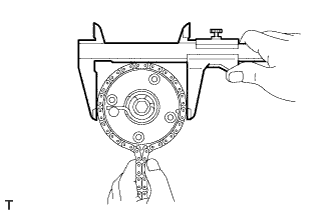 |
Using a vernier caliper, measure the diameter of the sprocket and chain.
- Minimum sprocket diameter (with chain):
- 96.8 mm (3.811 in.)
- NOTICE:
- The vernier caliper must be in contact with the chain rollers when measuring.
| 11. INSPECT CRANKSHAFT TIMING GEAR |
Place the chain around the gear.
 |
Using a vernier caliper, measure the diameter of the gear and chain.
- Minimum gear diameter (with chain):
- 51.1 mm (2.012 in.)
- NOTICE:
- The vernier caliper must be in contact with the chain rollers when measuring.
| 12. INSPECT CHAIN TENSIONER SLIPPER |
Using a vernier caliper, measure the tensioner slipper wear.
- Maximum wear:
- 1.0 mm (0.039 in.)
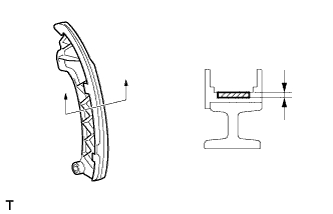 |
| 13. INSPECT NO. 1 CHAIN VIBRATION DAMPER |
Using a vernier caliper, measure the vibration damper wear.
- Maximum wear:
- 1.0 mm (0.039 in.)
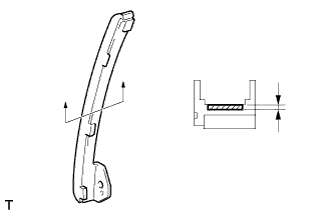 |
| 14. INSPECT NO. 2 CHAIN VIBRATION DAMPER |
Using a vernier caliper, measure the vibration damper wear.
- Maximum wear:
- 1.0 mm (0.039 in.)
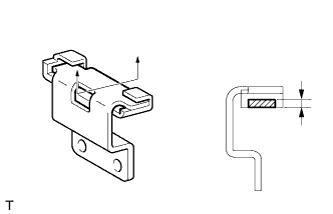 |
| 15. INSPECT CHAIN TENSIONER PLATE |
Using a vernier caliper, measure the chain tensioner plate wear.
- Maximum wear:
- 1.0 mm (0.039 in.)
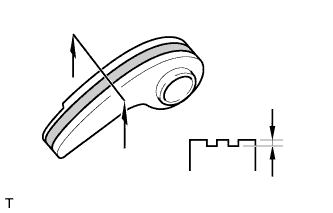 |
| 16. INSPECT NO. 1 CHAIN TENSIONER |
Check that the plunger moves smoothly when the ratchet pawl is raised by hand.
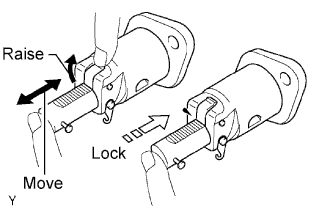 |
Release the ratchet pawl, then check that the plunger is locked in place by the ratchet pawl and does not move when pushed by hand.
| 17. INSPECT CAMSHAFT |
Inspect the camshaft for runout.
Place the camshaft on V-blocks.
Using a dial indicator, measure the circle runout at the center journal.
- Maximum circle runout:
- 0.04 mm (0.0016 in.)
 |
Inspect the cam lobes.
Using a micrometer, measure the cam lobe height.
- Standard cam lobe height:
- 42.816 to 42.916 mm (1.6857 to 1.6896 in.)
- Minimum cam lobe height:
- 42.666 mm (1.6798 in.)
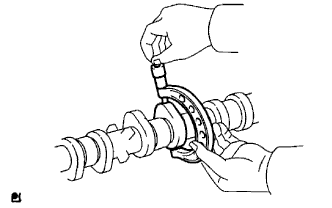 |
Inspect the camshaft journals.
Using a micrometer, measure the journal diameter.
- Standard Journal Diameter:
Journal Position Specified Condition No. 1 34.449 to 34.465 mm (1.3563 to 1.3569 in.) Other 22.949 to 22.965 mm (0.9035 to 0.9041 in.)
 |
| 18. INSPECT NO. 2 CAMSHAFT |
Inspect the No. 2 camshaft for runout.
Place the No. 2 camshaft on V-blocks.
Using a dial indicator, measure the circle runout at the center journal.
- Maximum circle runout:
- 0.04 mm (0.0016 in.)
 |
Inspect the cam lobes.
Using a micrometer, measure the cam lobe height.
- Standard cam lobe height:
- 44.336 to 44.436 mm (1.7455 to 1.7494 in.)
- Minimum cam lobe height:
- 44.186 mm (1.7396 in.)
 |
Inspect the camshaft journals.
Using a micrometer, measure the journal diameter.
- Standard Journal Diameter:
Journal Position Specified Condition No. 1 34.449 to 34.465 mm (1.3563 to 1.3569 in.) Other 22.949 to 22.965 mm (0.9035 to 0.9041 in.)
 |
| 19. INSPECT CYLINDER HEAD SET BOLT |
Using a vernier caliper, measure the length of the cylinder head set bolt from the seat to the end.
- Standard bolt length:
- 146.8 to 148.2 mm (5.7795 to 5.8346 in.)
- Maximum bolt length:
- 149.2 mm (5.874 in.)
 |
Using a vernier caliper, measure the minimum diameter of the elongated thread at the measuring point.
- Standard outside diameter:
- 9.77 to 9.96 mm (0.3846 to 0.3921 in.)
- Minimum outside diameter:
- 9.4 mm (0.3701 in.)
- HINT:
- Using a straightedge, visually check thinner areas of the threaded part of the cylinder head set bolt.
| 20. INSPECT EXHAUST MANIFOLD |
Using a precision straightedge and feeler gauge, measure the warpage on the contact surface of the cylinder head.
- Maximum warpage:
- 0.7 mm (0.028 in.)
- HINT:
- If the warpage is greater than the maximum, replace the manifold.
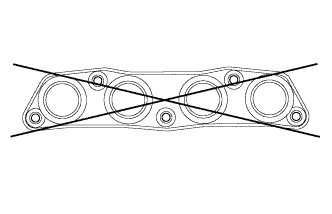 |